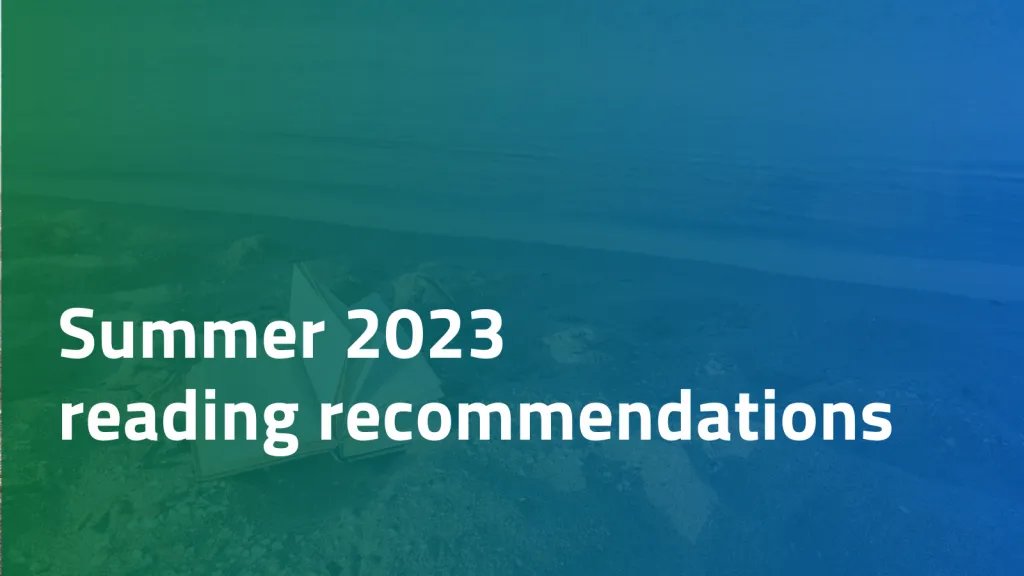Summer 2023 reading recommendations for EL educators


Summer 2023 reading recommendations for EL educators
As the school year draws to a close, we hope you are looking forward to a few months to rest and recharge over summer. At Ellevation, we understand the importance of continuous learning, even during well-deserved breaks. That's why we’ve compiled a curated list of summer reading recommendations, handpicked from the insightful conversations with our guests on the latest season of our podcast, Highest Aspirations.
This season covered topics ranging from ChatGPT and AI in education to rethinking the terminology we use in the landscape of ELs education, and the book recommendations from our guests were as wide-ranging as our conversation topics.
So this summer we wish you all the opportunity to unwind and allow these exceptional books to inspire, educate, and elevate your understanding of multilingual education and its transformative power in the classroom.
Ellevation’s 2023 Summer Reading List
The Vanishing Half, by Brit Bennett
This recommendation comes from Chris Mah, who joined us this season for a thought-provoking chat about AI in education. He shared this pick from a “fiction lover standpoint,”, which follows the story of twin sisters who live very different lives and offers an exploration of the American history of white “passing”.
“Really amazing, just beautifully written book about race and identity in America. Being produced for an HBO series. I read it three years ago. Nothing I've read since has come close,” says Mah.
Atomic Habits, by James Clear
Recommended by Adrian Mendoza during his episode on embracing mathematical mindsets, this popular pick for in the self-help/nonfiction category offers readers a comprehensive guide on breaking bad habits and improving their lifestyle a small amount, every day. Mendoza added that his wife was reading it simultaneously which led to great opportunities for discussion - this could be a great option for a summer book club!
Long-Term Success for Experienced Multilinguals, by Tan Huynh and Beth Skelton
During our episode with Tan Huynh and Beth Skelton, we had a powerful discussion about the impact that labels have on our students, in particular the term “Long Term English Learner” and how these students tend to stay in a “negative whirlpool of low expectations” with less access to challenging classes and opportunities to attend elective classes than other students” They explain more about their proposed new term in their new book on the topic.
“The title is Long-Term Success for Experienced Multilinguals. And yeah, we kept that word long-term, but we twisted it. It's the positive, that it is a long-term process and that our students will have long-term success if we create these conditions for that long-term success,” explains Skelton.
During the episode, Huynh and Skelton offered listeners a discount code for purchasing the book: use the code SAVE20 for books ordered through Corwin.
Portraits of Collaboration, By Dr. Andrea Honigsfeld, Valentina Gonzalez and Maria Dove.
This season we had a fantastic conversation with Dr. Andrea Honigsfeld and Valentina Gonzalez on strategies for collaborating with reluctant teachers in support of multilingual learners. They authored a chapter of this book on the topic, which we are excited to recommend because reluctance in co-teaching and collaboration is a challenge which is commonly felt but often avoided or ignored.
“We have to recognize that collaboration, collaborative practices, they aren't an initiative. And we have to think about reframing the practices. We aren't doing something new here. We are just changing the way we look at the work we're already doing. We're all already doing this work. We all want our students to be successful. But how can we work together so that we're not working so hard, but we're sharing this workload for the same common goal?” says Gonzalez.
Life, Literacy, and the Pursuit of Happiness, by Don Vu
Finally, longtime El Community contributor Tan Huynh shared another reading recommendation during our conversation. It is perfect opportunity for educators to better understand their immigrant and refugee students and how to support them during the break. As our country becomes increasingly diverse in places where this hasn’t been the case in the past, it is valuable for all educators to be prepared to welcome students from other countries into their classrooms this fall.
Happy reading!